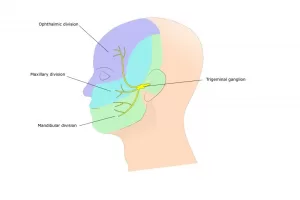Trigeminal Neuralgia- symptoms, causes & treatment
What is Trigeminal Neuralgia?
- Trigeminal Neuralgia is a chronic pain condition affecting the Trigeminal Nerve
- The Trigeminal Nerve is responsible for sensation in the face. It also supplies certain muscles involved in biting and chewing.
- Trigeminal Neuralgia causes bouts of severe stabbing nerve (neuropathic) pain, often described as feeling like electric shocks, on one side of the face. These bouts of facial pain can last from seconds to minutes and may happen many times per hour. This is sometimes called “Type 1” Trigeminal Neuralgia.
- In “Type 2” Trigeminal Neuralgia, a person may experience a less severe but more constant, dull, burning facial pain.
- Some people experience both types- a combination of the constant background pain and the sharp severe stabs.
- Treatment for Trigeminal Neuralgia may involve medication, or less commonly, surgery.
A bit more about the symptoms of Trigeminal Neuralgia
- The trigeminal nerve has three branches- depending on which of these are involved, the nerve pain may affect the front of the scalp, the forehead, the cheek, the gums and around the jaw.
- Trigeminal Neuralgia does not usually affect both sides of the face, but in rare cases it may do so.
- Bouts of facial pain may last from seconds to minutes, though most often less than a minute.
- The frequency of these bouts of pain can range from a few times a day to more than a hundred.
- Triggers for the pain include light touch (for example when shaving or applying makeup), talking, eating, brushing teeth, washing or even a cool breeze blowing onto the face. However, quite often it’ll happen without any obvious trigger.
- In between episodes, there may be breaks or remissions lasting from months to years, but unfortunately it tends to gradually get worse over time, with medication becoming less effective and the intervals between flare ups getting shorter.
How common is Trigeminal Neuralgia and who gets it?
- It’s relatively rare- around 1 or 2 people in 10,000 will get it per year- but it has a high impact on those who suffer from it.
- It’s more common in women than in men
- It’s more common in people over the age of 50
What causes Trigeminal Neuralgia?
A cause is not always found, but in some cases it can be related to the following:
- Damage to the outer lining of the nerve (due to injury, pressure on the nerve from an abnormal blood vessel nearby, dental or sinus surgery)
- Stroke
- A tumour
- Multiple Sclerosis
What else causes facial pain?
Other similar conditions associated with facial pain include:
- post-herpetic neuralgia (nerve pain following shingles)
- cluster headaches
- temporomandibular joint disorder (TMJ dysfunction)
What are the complications of Trigeminal Neuralgia?
It can be a very distressing, debilitating condition, and may lead to people becoming socially withdrawn and being unable to work. It may also lead to sleep disturbances and depression.

What is the treatment for Trigeminal Neuralgia?
Medications that are often helpful include:
- anti-seizure medications (there are many different types, and response varies between individuals)
- medications used for nerve pain
In severe cases where medication is not working or has stopped being effective, surgical options may be considered. There are various surgical techniques, ranging from cutting the nerve (rhizotomy), to injections and radiation treatment. Responses to surgical treatment for Trigeminal Neuralgia are variable and there can be side effects and complications (such as facial numbness)- so it’s usually reserved for severe cases.
If you’d like to know more about the symptoms of Trigeminal Neuralgia, as well as diagnosis and treatment options, check out the Brain Foundation website or speak to your GP.
Getting a Mental Health Care Plan in Australia: Your Guide
Getting a Mental Health Care Plan in Australia: Your Guide Mental health matters—and if you’re feeling overwhelmed, anxious, or down, a mental health care plan can help. But what is it, and how do [...]
UTI Symptoms and Treatment: What You Need to Know
UTI Symptoms and Treatment: What You Need to Know Urinary Tract Infections (UTIs) are common, uncomfortable, and often disruptive. But what exactly are the signs to watch for, and how can you get relief [...]
Free Mental Health Care Plan Online | Bulk-Billed by Qoctor
Free Mental Health Care Plan Online | Bulk-Billed by Qoctor Discover how to get a free, bulk-billed Mental Health Care Plan (MHCP) in Australia through Qoctor's telehealth service. Accessing [...]




